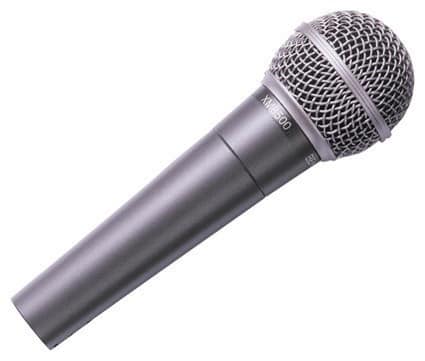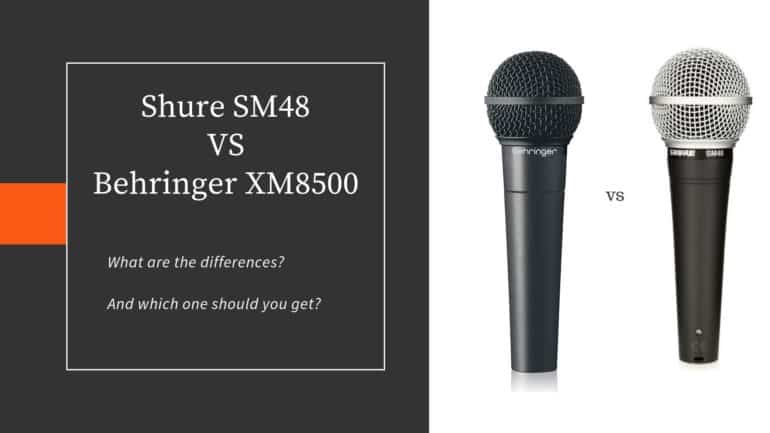Last updated on December 30th, 2023 at 02:52 pm
Quality recording gear doesn’t necessarily need to be expensive, and this is definitely the case with both the Shure SM48 and the Behringer Ultravoice XM8500.
Both of these microphones are two popular choices mainly because they are so budget-friendly.
The question, however, is which one you should choose?…
In this post I’ll give you my answer to this since it all depends on what you’re going to be using the mic for.
Let’s get started…
Shure SM48

The Shure SM48 is the affordable version of the sure SM58, which has now become the industry standard for live performances and even some studio recordings..
It is a lot cheaper than any other microphone of that quality.
You can get one with an On/Off switch which will cost you a bit more, but still, the price won’t be much of an issue.
It is a great alternative to the SM58, especially considering that it’s much more affordable while sounding very similar.
This Microphone has a built-in pop-filter, but you will need to use an external one if you want to completely avoid the plosives.
The build quality of the SM48 is extremely good, you could drop it a hundred times and it would still work perfectly.
The sound quality is also very good, it sounds clear and crisp, not as good as something like the SM58, but the differences are hardly noticeable, especially if you don’t have a trained ear…
And in a live setting you really will not be able to tell the difference.
It comes with a bass roll-off which helps control the proximity effect, plus a mid-boost which helps the vocals cut through the mix.
This mic provides good feedback- and handling noise rejection, better than the Behringer XM8500, and it’s also good at rejecting off-axis sound.
How does it perform?
Ok so, here we get into the fun- and even more important- part of the post.
To my ears, the Shure SM48 does sound quite good when recording spoken word or when singing.
However, the upper mid- and high- frequencies sound a bit dull to me.
This is why, even though it still is a great microphone, I wouldn’t want to use it on vocals as my main microphone.
Having said that, when recording acoustic or electric guitars, it sounds fantastic.
Now, when considering the handling noise, feedback rejection, off-axis noise rejection, and plosives management, I think that the SM48 does a more than decent job.
What this means for you is that it’s a fairly versatile microphone, and even though I think that it’s not the best microphone for spoken word or singing, it still does sound pretty damn good…
Plus, this all depends on your voice…
If you have a super deep voice, then I can see the SM48 being good for vocals as well.
I wrote another post comparing the Shure SM58 and the Shure SM48 which you might find useful.
What do you get in the Box?
- The Shure SM48 Microphone
- Microphone Stand Clip
- Carrying Pouch
Features
- Cardioid pickup pattern rejects off-axis sound and feedback
- Brightened mid-range and bass rolloff.
- Shock-mounted cartridge for reduced handling noise
- Built-in pop-filter, which works quite well, still you should use an external one
- Great build quality and ruggedness
Specifications
| Polar Pattern | Cardioid |
| Microphone type | Dynamic |
| Frequency Response | 55 to 14,000 Hz |
| Output Impedance | Rated impedance is 150 Ohms (300 Ohms actual) |
| Connector | Three-pin (XLR), male |
Purchasing a microphone on a budget can be tough, since you don’t know if what you are getting is good or simply junk.
Luckily, the SM48 is a great and very affordable microphone. Plus, if you end up not liking it you didn’t really waste any money since it’s so cheap.
Find out more about the Shure SM48 here:
- Shure SM48: Amazon, Sweetwater.
Moving on…
Behringer UltraVoice XM8500

The Behringer XM8500 is a fairly popular handheld cardioid microphone known for its great cost-to-quality ratio.
It doesn’t provide any outstanding features which is completely fine, considering the price.
The build quality is just fantastic and it absolutely looks like it could take a beating and keep on working like nothing happened… It feels pretty durable.
Note: This is always considering the very low price of the mic.
Since it’s a Dynamic XLR microphone, it can be used for live performances as well as recording at home, and the great thing is that thanks to being a dynamic cardioid microphone, it can handle high SPL and reject feedback quite well.
The frequency response ranges from 50Hz all the way up to 15kHz which is fairly common for any dynamic mics, especially the ones designed for vocal use.
Like most vocal microphones, it has a slightly boosted mid-range which should help emphasize the vocals and allow them to better cut though the mix.
Both during live shows or when recording at home, however, plosives can be a real issue…
The Behringer XM8500 comes with an internal pop filter which should, hopefully, reduce the plosives… but I’d advice you get an external pop filter just in case, especially when recording at home.
All in all, this is an excellent microphone when taking cost-efficiency into account…
However, if you ask my personal opinion… I’d recommend the Shure SM48 over this one since sounds slightly better…
Plus, you have the choice to get one with an On-Off switch which the Behringer XM8500 doesn’t provide.
Still, this is a very cost-efficient microphone and it’s definitely worth the money.
How does it perform?
The Behringer XM8500 sounds pretty damn well when recording anything voice-related.
And, if you remember what I said about the SM48, that one wasn’t AS good at recording vocals.
I think that the XM8500 sounds clearer, more open, and airier, which is something that I really like for vocals since it’s how I want them to sound.
On the other hand, when recording electric guitar, it does sound pretty dark and lifeless…
And on the acoustic it’s even worse; it sounds completely dead.
This is why I would only recommend the XM8500 for vocals, and nothing more!
When it comes to the handling noise, feedback rejection, plosives management, etc. I think that it didn’t do as well as the SM48, but just slightly.
I would absolutely recommend the XM8500 if you’re only planning on using it to record vocals or anything voice-related.
Related: Shure SM58 vs Sennheiser e835.
What do you get in the Box?
- Extremely good Storage Box
- The Behringer XM8500 Microphone
- Microphone Clip
- Microphone Stand adapter
Features
- Great Build Quality
- Good Vocal Microphone
- Cardioid Polar Pattern which helps minimize background noise
Specifications
| Polar Pattern | Cardioid |
| Microphone type | Dynamic |
| Frequency Response | 50 to 15,000 Hz |
| Output Impedance | Rated impedance is 150 Ohms |
| Connector | Three-pin (XLR), male |
Here’s a link to Amazon where you can not only see the price of the Behringer XM8500, but also the reviews.
Which one Should You Choose?
Like I mentioned, the XM8500 is a better vocal microphone, plus it sells for half as much as the SM48.
So, if you’re thinking about purchasing a microphone that’s only going to be used for voice-related applications, then absolutely go for the XM8500.
However, the SM48 is much more versatile since it does record vocals quite well, but the major difference lies in how well it records instruments when compared to the XM8500.
This is why I believe that the SM48 is an overall better microphone simply due to its versatility.
The XM8500 only beats the SM48 at one thing, which is why you should only purchase it if you know for certain that you’re only going to record vocal-related stuff with it.
Differences
The Behringer XM8500 records vocals better than the SM48, giving them a more open and airy sound, while the SM48 is better at recording instruments such as acoustic and electric guitars, meaning that it’s a more versatile microphone.
Lastly, the XM8500 sells for about half of what the SM48 does.
Conclusion
Both are excellent microphones mainly because they are dirt cheap, and it’s hard to find any other microphones which sound this good at such an affordable price.
If you know that you’re only going to be recording vocals, then go with the Behringer XM8500.
Otherwise, if you need a more versatile microphone, go with the Shure SM48.
I hope this information was useful!
Have a great day!

Fuckin A. Good comparison, mate.